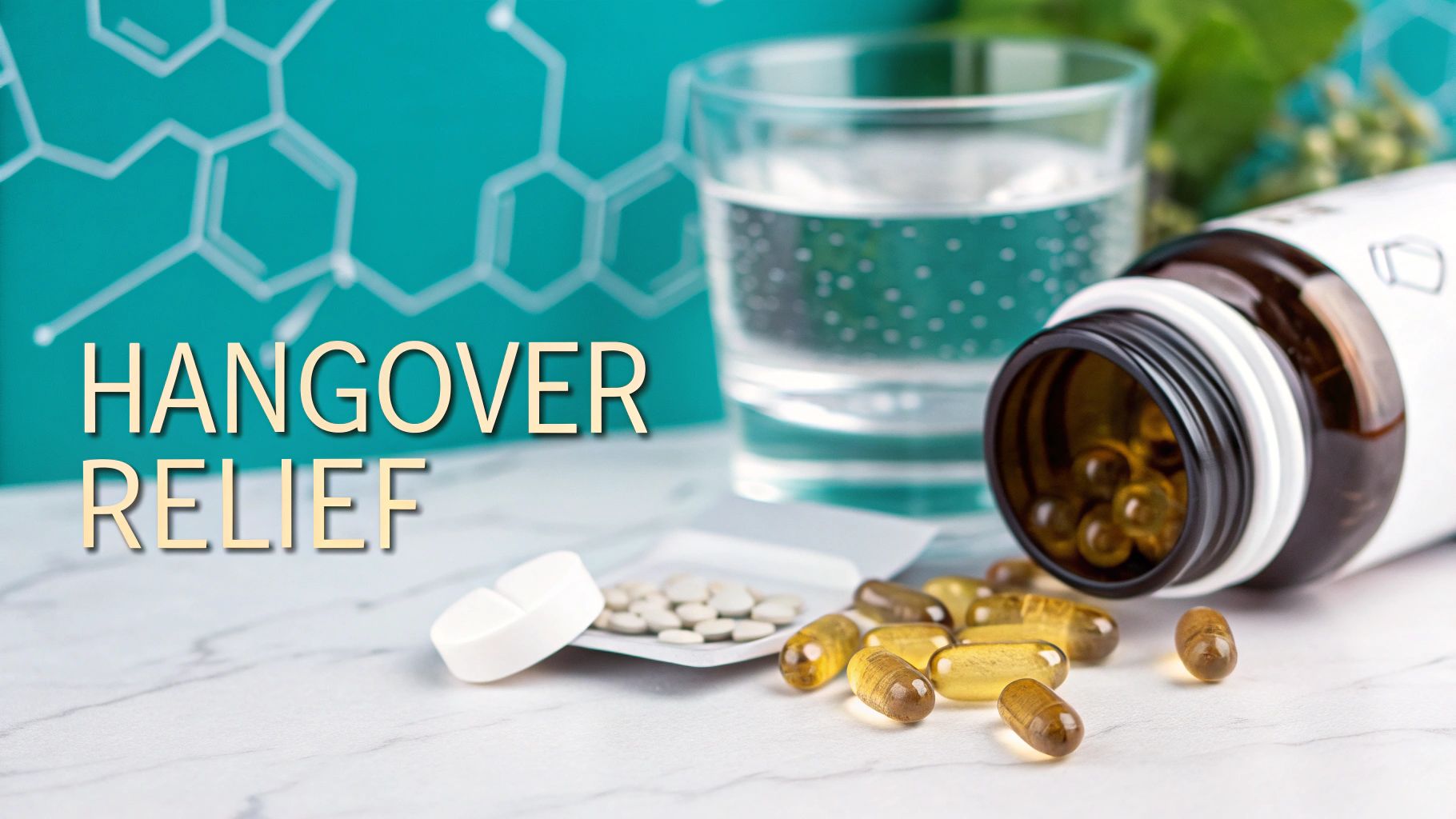

· By Annemarie
Vitamin B and Hangovers: Science-Backed Relief That Works
Why Your Body Craves B Vitamins After Drinking
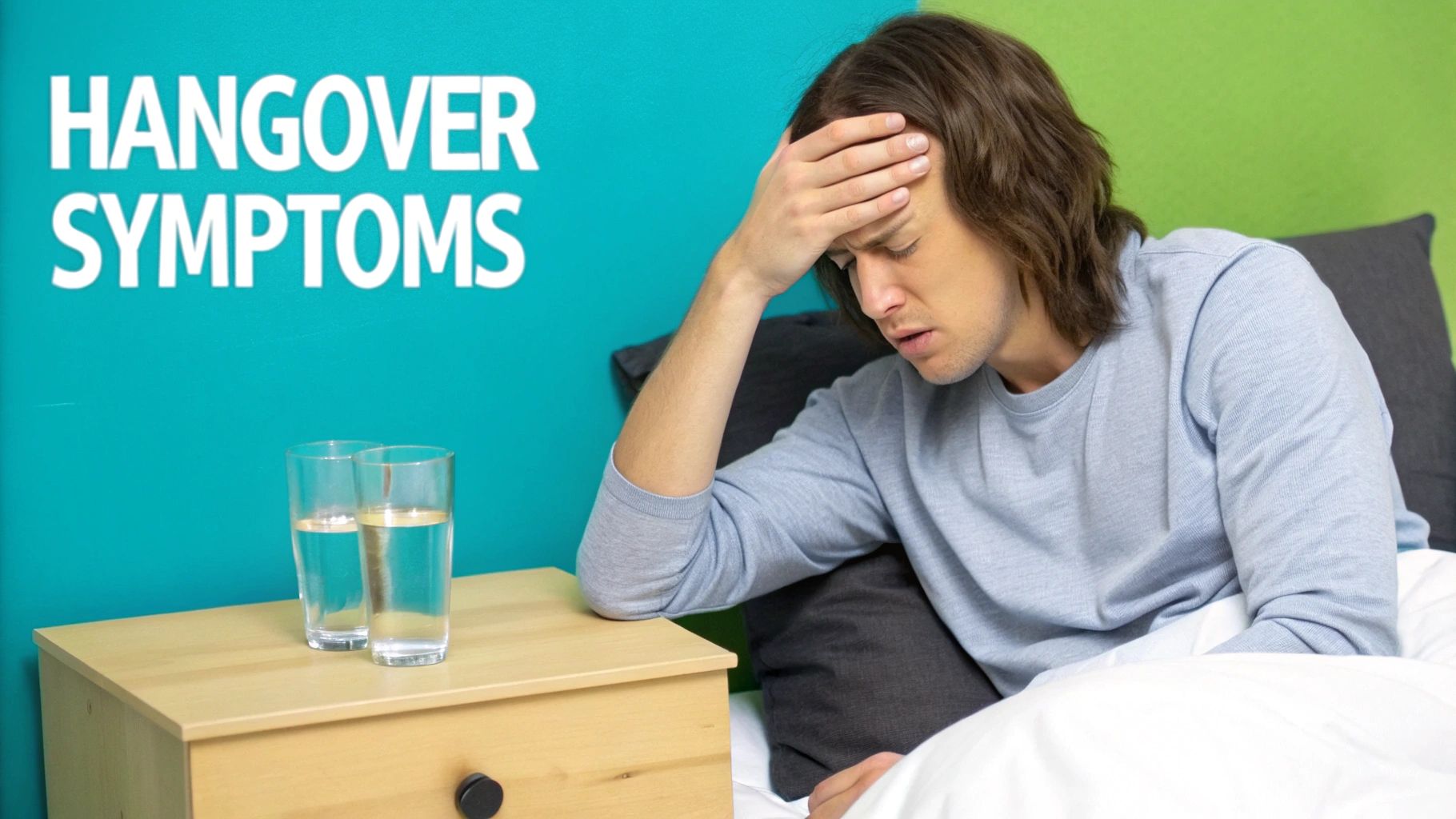
Waking up after a few drinks feeling completely wiped out? It's not just dehydration. Alcohol has a significant impact on your vitamin B levels. Your body uses a considerable amount of these essential nutrients while processing alcohol. This depletion leaves you feeling drained and contributes to that dreaded hangover. Want to know more? Check out this article: What Causes Hangovers?
The Liver's Role in Alcohol Metabolism and B Vitamin Depletion
Your liver is the main organ responsible for metabolizing alcohol. This intricate process involves a variety of enzymes, and many of them depend on B vitamins as cofactors. Cofactors are like essential tools that enzymes need to function properly.
For instance, thiamine (B1) is crucial for the enzyme that breaks down acetaldehyde, a toxic byproduct of alcohol metabolism. Without enough thiamine, this process slows down. This can lead to a buildup of acetaldehyde and worsen hangover symptoms.
Alcohol also interferes with the absorption and use of other B vitamins, such as pyridoxine (B6) and cobalamin (B12). These vitamins are essential for energy production, nerve function, and red blood cell formation. All these processes are affected by a hangover. This disruption further contributes to fatigue, brain fog, and the overall feeling of malaise. The use of vitamin B for hangover relief has a history due to its potential benefits. Alcohol consumption can lead to a deficiency in certain B vitamins, like thiamine (B1) and pyridoxine (B6), vital for metabolic processes. Learn more about the connection between alcohol and vitamin B deficiency.
The Importance of Replenishing B Vitamins
Alcohol metabolism significantly depletes B vitamins, making replenishing these nutrients vital for minimizing hangover symptoms and supporting recovery. This is where vitamin B supplementation can be particularly helpful. By providing your body with the necessary tools to effectively process alcohol and its byproducts, you can reduce some of the negative effects and potentially lessen hangover severity. Taking a proactive approach like this can aid your body's natural recovery processes and help you bounce back faster.
The B Vitamins That Actually Make A Difference
Not all B vitamins are created equal when it comes to hangovers. Marketing can sometimes oversell their benefits. Let's focus on the B vitamins with real scientific support for hangover relief: thiamine (B1), pyridoxine (B6), niacin (B3), and cobalamin (B12). We’ll explore how each one addresses specific aspects of alcohol recovery.
Thiamine (B1): Combating Fatigue and Brain Fog
Thiamine is key in breaking down acetaldehyde, a toxic byproduct of alcohol metabolism. Alcohol depletes thiamine, hindering this process and potentially worsening hangover symptoms like fatigue and brain fog. Replenishing thiamine helps your body efficiently process acetaldehyde, promoting faster recovery.
Pyridoxine (B6): Taming Nausea
Pyridoxine is essential for proper neurotransmitter function, which alcohol can disrupt. This disruption often leads to nausea, a common hangover symptom. Supplementing with B6 can help restore neurotransmitter balance and ease that queasy feeling. The recommended daily allowance (RDA) for B6 is 1.3 mg.
Niacin (B3): Supporting Overall Recovery
Niacin supports energy production, which is significantly impacted by alcohol. It also helps repair cellular damage caused by alcohol’s toxic effects. Ensuring adequate niacin intake can contribute to overall recovery and reduce hangover duration. Research even suggests a link between higher dietary nicotinic acid (a form of B3) and zinc intake with less severe hangovers. The impact of nutrient intake on hangovers. For more information on vitamins and hangovers, see Essential vitamins for hangover relief.
Cobalamin (B12): Restoring Energy Levels
Like other B vitamins, cobalamin is vital for energy production and red blood cell formation. Alcohol disrupts these processes, contributing to fatigue and weakness. Replenishing B12 can help restore energy levels and combat that hangover-related exhaustion.
To help visualize the benefits of different B Vitamins for hangover relief, take a look at the comparison table below:
B Vitamins for Hangover Relief Comparison: This table compares different B vitamins, highlighting their benefits, recommended dosages, and effectiveness for hangover symptoms.
| B Vitamin | Primary Benefit | Recommended Dose | Best Timing | Effectiveness Rating |
|---|---|---|---|---|
| Thiamine (B1) | Combating fatigue and brain fog | Varies | Before, during, or after drinking | Moderate |
| Pyridoxine (B6) | Reducing nausea | 1.3 mg daily | Before or during drinking | Moderate |
| Niacin (B3) | Supporting overall recovery and energy production | Varies | Before, during, or after drinking | Moderate |
| Cobalamin (B12) | Restoring energy levels and red blood cell formation | Varies | Before, during, or after drinking | Moderate |
As shown in the table above, several B vitamins can play a role in mitigating hangover symptoms. Consulting with a healthcare professional can help determine the right dosage and timing for your individual needs.
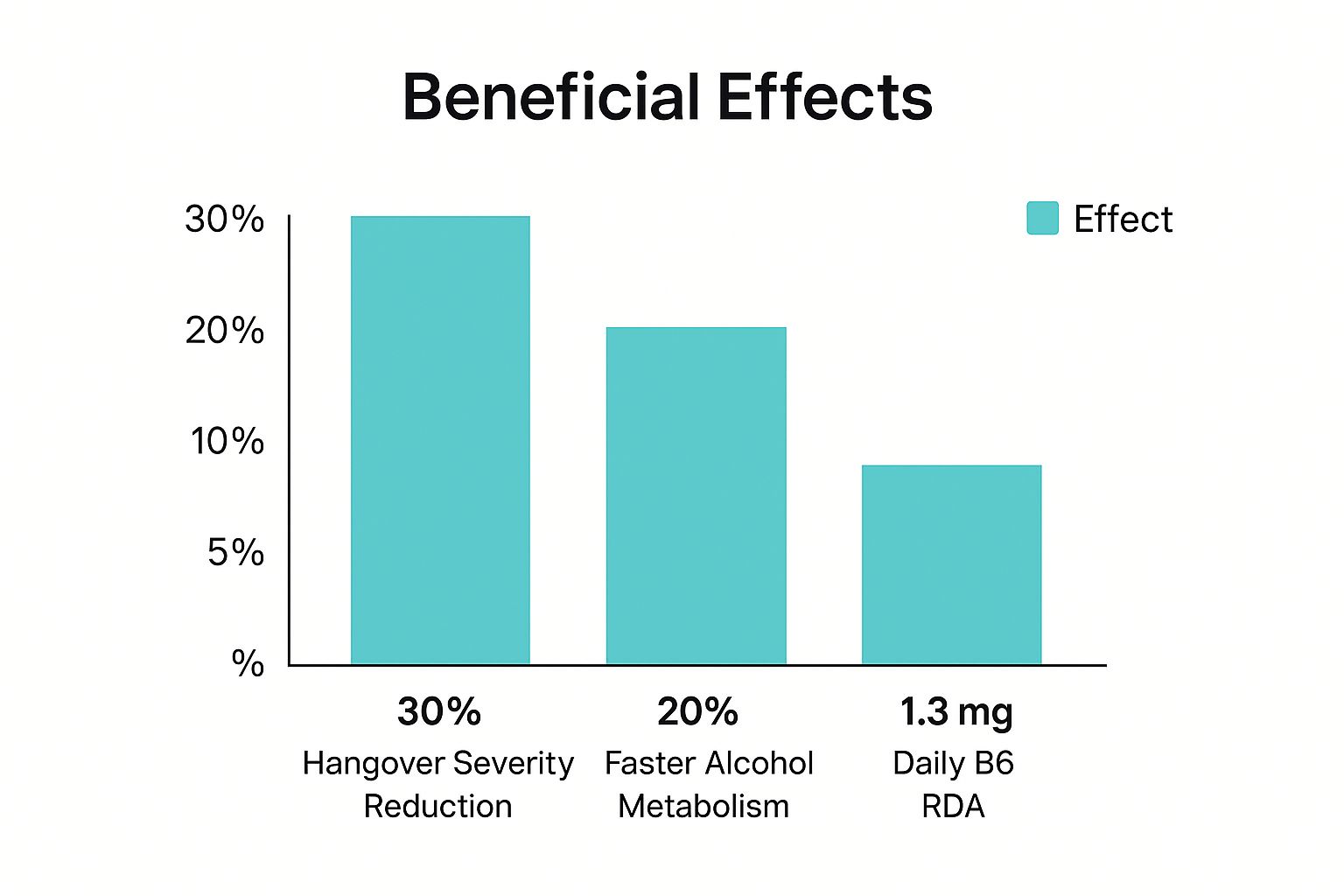
This infographic provides a visual representation of B6's impact on hangovers. Note the potential 30% reduction in hangover severity and a 20% increase in alcohol metabolism speed. This underscores the significant role B vitamins, particularly B6, can play in managing hangover symptoms.
What Research Really Says About B Vitamin Effectiveness
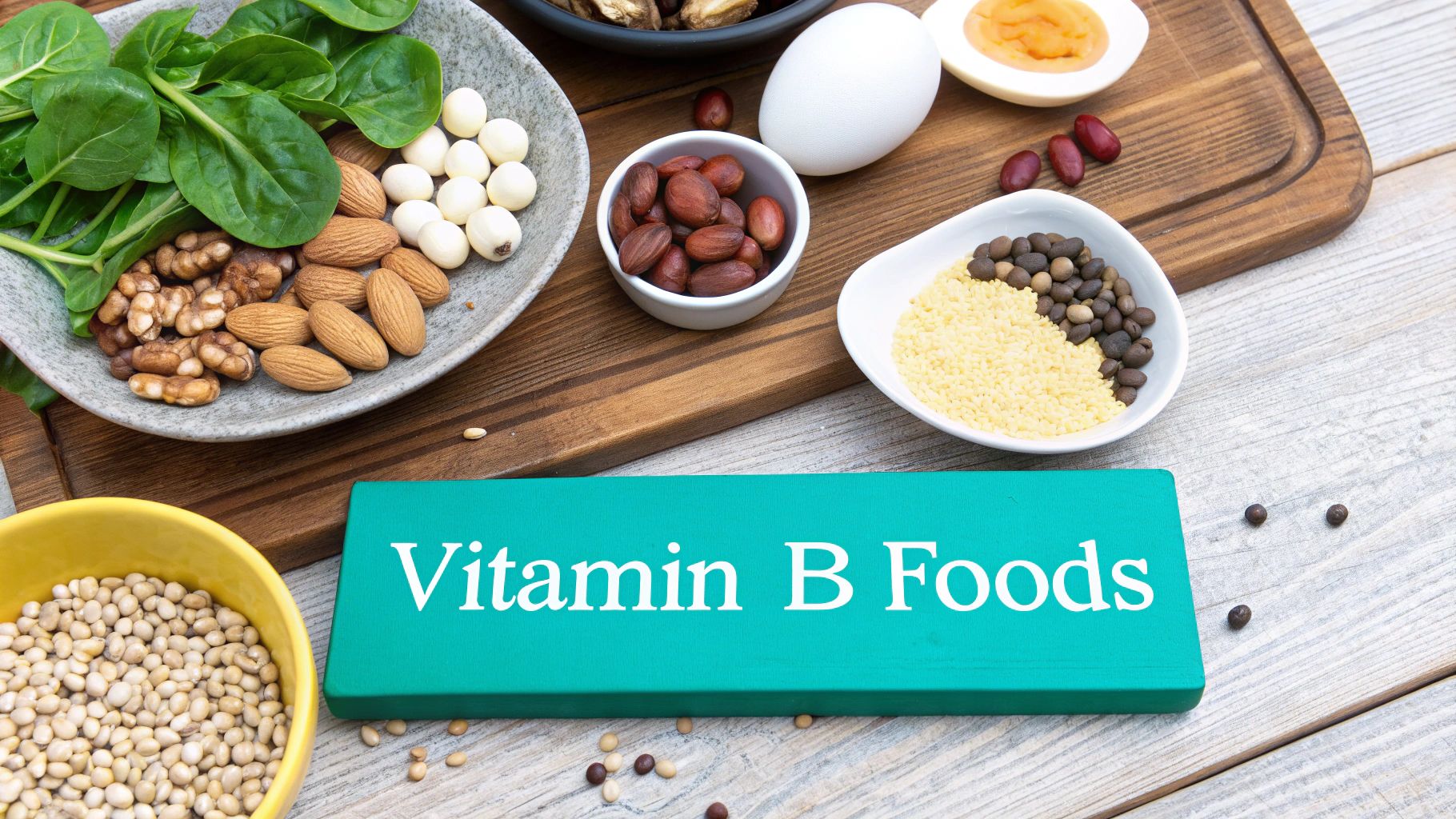
Let's explore the connection between vitamin B and hangovers, separating fact from fiction. This involves a deep dive into peer-reviewed studies to understand the true impact of B vitamins on hangover relief.
Analyzing Existing Research on B Vitamins and Hangovers
Many studies have examined the potential of vitamin B to ease hangover symptoms. Some show promising results, indicating that B vitamins might lessen the severity of certain hangover issues. For example, some research indicates that taking B vitamins before or after drinking alcohol may reduce hangover severity by addressing potential deficiencies.
However, the effectiveness isn't consistent. Some smaller studies show positive results, while others haven't shown noticeable improvements in symptoms like headaches, nausea, or fatigue. Read the full research here. You might also be interested in How to cure a hangover fast.
Limitations and Challenges in Hangover Research
It’s important to acknowledge the current limitations of research in this area. Many studies on vitamin B and hangovers have small sample sizes, making it hard to apply the findings to larger populations. More research with larger and more diverse groups is needed to validate these early findings.
Studying hangovers also presents specific challenges. Measuring hangover severity accurately is difficult, relying on individuals' self-reporting. Ethical concerns also restrict the kinds of studies possible. For instance, it's unethical to encourage excessive alcohol consumption in participants.
This makes it hard to control alcohol intake and ensure consistent intoxication levels, making it tougher to draw firm conclusions about vitamin B's role in hangover recovery.
The Importance of Continued Research
Despite these challenges, understanding the potential of vitamin B for hangover relief remains important. Further research is needed to understand the complex relationship between alcohol, B vitamins, and hangover symptoms.
Future studies should focus on:
- Larger sample sizes
- Standardized measures of hangover severity
- Exploring how B vitamins might affect recovery
This research is key for developing recommendations for hangover prevention and treatment based on scientific evidence. This will help distinguish truly effective strategies from those that don't work.
Smart Dosing And Timing For Maximum Relief
Knowing which B vitamins can help with hangovers is a great start. But understanding when and how much to take can significantly improve your results. This section explores how to optimize your vitamin B and hangover strategy for real relief.
Preventive Dosing vs. Post-Hangover Treatment
Should you take B vitamins before, during, or after drinking? Both preventive and reactive approaches have potential benefits. Taking B vitamins before or during alcohol consumption attempts to minimize the depletion caused by alcohol processing. This "pre-loading" could help lessen the hangover's severity.
Taking B vitamins after drinking aims to replenish lost nutrients and support the body's recovery. Individual responses differ. Experimenting with both strategies will help determine what works best for you. Factors like your metabolism, the amount of alcohol consumed, and the specific B vitamins used all play a role.
Factors Influencing B Vitamin Absorption
Several factors influence how your body absorbs and uses B vitamins. Consuming them with food, for example, can improve absorption, particularly for vitamins like B12, which needs stomach acid. Taking B vitamins with a meal or snack might be more effective than taking them on an empty stomach.
Certain foods can hinder the absorption of specific B vitamins. Individual metabolic differences also play a role. Some people process nutrients more efficiently than others. Finding the optimal dose and timing is a personalized process.
Choosing the Right Delivery Method
B vitamins come in various forms, including tablets, capsules, sublingual options, and even injections in IV drips. Sublingual forms absorb directly into the bloodstream, bypassing the digestive system. This can be helpful if you have nausea or a sensitive stomach. Traditional tablets and capsules, while convenient, have a slower absorption rate. Understanding these differences helps you choose the best delivery method for your needs. This maximizes the effectiveness of your vitamin B and hangover recovery plan.
Practical Tips For Optimized B Vitamin Intake
Here are some practical tips for maximizing the benefits of B vitamins:
- Start with a balanced B-complex: This offers a broad spectrum of B vitamins.
- Consider a higher dose of specific B vitamins: If you experience certain hangover symptoms more intensely (like nausea or fatigue), adjusting your intake may help. For example, vitamin B6 may help with nausea and vitamin B1 with fatigue.
- Experiment with timing: Try taking B vitamins before, during, and after drinking to find your best approach.
- Prioritize quality supplements: Choose reputable brands that offer bioavailable forms of B vitamins.
- Don't exceed recommended dosages: Consult a healthcare professional if you have any health concerns.
- Combine with other hangover remedies: B vitamins can work well alongside other strategies, like hydration and nutritious food.
By understanding these factors and implementing these strategies, you can personalize your vitamin B and hangover approach. Remember that individual responses vary, so experimentation is crucial.
Food-Based Solutions That Actually Work
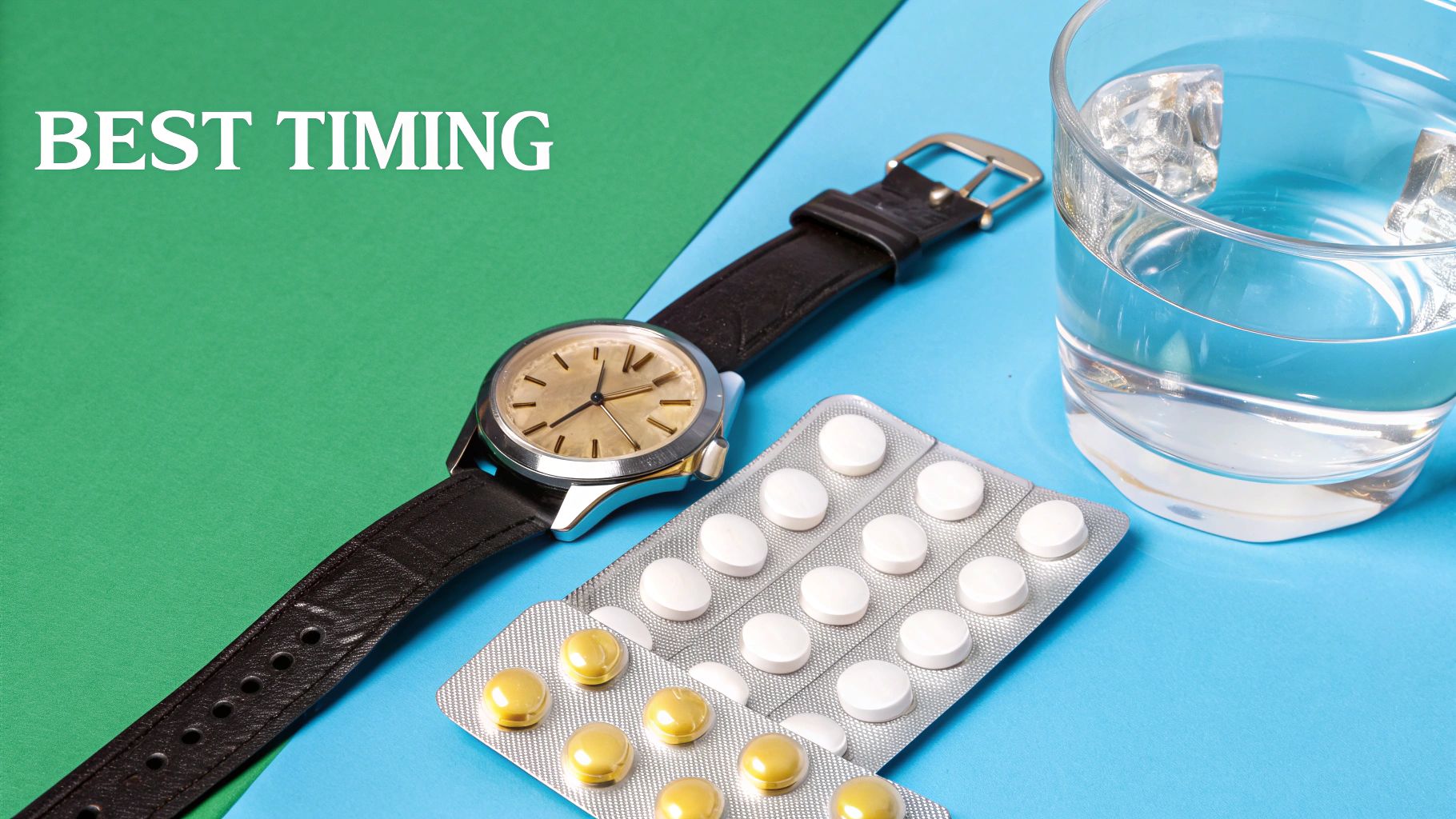
While vitamin B supplements can offer quick hangover relief, incorporating whole food sources into your diet is a more sustainable approach. These foods provide not only B vitamins but also a wealth of other essential nutrients, promoting overall health and well-being. This means the benefits extend far beyond just hangover prevention.
The Power of Nutrient-Dense Foods
Nutrient-dense foods are packed with the vitamins, minerals, and antioxidants your body craves to function at its best. After a night of drinking, these nutrients can help replenish what alcohol depletes. B vitamins, in particular, play a crucial role in restoring energy levels, supporting liver function, and mitigating some of alcohol's negative effects.
Identifying Bioavailable B Vitamins in Food
It's important to understand that not all B vitamins are absorbed equally. Bioavailability, the proportion of a nutrient your body can effectively absorb and use, is key. Luckily, whole foods offer B vitamins in highly bioavailable forms. This means your body can readily access and utilize these essential nutrients, even when your digestive system might be feeling a little sluggish after a night out.
Practical Meal Planning Strategies
Planning your meals strategically can significantly impact your hangover recovery. Prioritizing nutrient-rich foods both before and after drinking can help lessen alcohol's impact.
- Before drinking: A meal with complex carbohydrates, healthy fats, and lean protein can provide sustained energy and slow alcohol absorption.
- After drinking: Replenishing lost nutrients with B vitamin rich foods like eggs, leafy greens, and whole grains can help you bounce back.
To help you choose the best foods, here’s a handy table outlining some top sources of those hangover-fighting B vitamins:
Top Food Sources of Hangover-Fighting B Vitamins
| Food Source | B Vitamin Content | Serving Size | Additional Benefits | Best Preparation Method |
|---|---|---|---|---|
| Eggs | Excellent source of B12, B6, and B2 | 2 large eggs | Protein, choline for liver health | Scrambled, poached, or in an omelet |
| Leafy Greens (Spinach, Kale) | Good source of B6, B9 (folate) | 1 cup cooked | Rich in antioxidants, fiber | Steamed, sauteed, or in a smoothie |
| Whole Grains (Oats, Brown Rice) | Good source of B1, B2, B3, and B6 | 1/2 cup cooked | Fiber for digestive health | Cooked as a side dish, in porridge, or as a base for a meal |
| Avocado | Contains B5, B6, and B9 | 1/2 medium avocado | Healthy fats, potassium | Sliced on toast, in guacamole, or added to salads |
| Legumes (Lentils, Chickpeas) | Good source of B6, B9, and B1 | 1 cup cooked | Plant-based protein, fiber | In soups, stews, salads, or as hummus |
This table highlights just a few examples of how readily available these important nutrients are in common foods. Adding them to your diet can provide a substantial boost to your overall health and help you recover more quickly after drinking.
Boosting Nutrient Absorption with Smart Food Combinations
Combining certain foods can further enhance nutrient absorption. Just as pairing vitamin C-rich foods with iron-rich foods improves iron absorption, combining foods high in B vitamins with other essential nutrients can maximize their overall benefit.
Lifestyle Factors for Enhanced Recovery
Nutrition plays a critical role in hangover recovery, but it's not the only factor. Adequate sleep, proper hydration, and stress management all contribute to a quicker bounce-back. These factors work together with your vitamin B intake to optimize your body's natural healing processes and reduce the severity of future hangovers. By adopting a holistic approach encompassing both diet and lifestyle, you can take control of your recovery and minimize alcohol's disruptive effects.
What Hangover Product Companies Don't Want You To Know
The hangover remedy market overflows with products promising a quick fix. But do they deliver? This section explores the hangover product industry, revealing the secrets manufacturers often keep hidden, and where vitamin B fits into the equation.
Decoding Marketing Hype vs. Scientific Reality
Many hangover products make bold claims. However, these claims aren't always supported by strong scientific evidence. Companies often rely on anecdotal evidence and personal stories rather than rigorous research. They may promote ingredients like vitamin C or milk thistle extract, along with vitamin B, without clear scientific proof of their effectiveness in alleviating hangover symptoms.
Furthermore, the market is saturated with pricey products that might be nothing more than expensive placebos. A discerning approach is crucial when considering these products. Don't fall for clever marketing; look for real, science-backed results. By 2021, over 80 hangover products were on the market, with vitamin B being one of the most common ingredients. Explore this topic further.
Ingredient Profiles and Pricing Strategies
Carefully reviewing ingredient lists is essential. Some products contain minimal amounts of potentially helpful ingredients, like vitamin B, relying instead on fillers and unnecessary additives. Other products combine various ingredients, making it hard to pinpoint what's truly effective.
Pricing can be deceptive, too. A high price tag doesn't necessarily guarantee higher quality or better results. In fact, some of the most effective remedies, like proper hydration and rest, are completely free. Be wary of products that depend heavily on marketing and branding to justify inflated prices.
Regulatory Oversight and Quality Control
The hangover remedy industry often lacks robust regulatory oversight. This lack of strict regulation can lead to quality control problems and inconsistent manufacturing practices. Some companies might take shortcuts to increase profits, impacting the purity and potency of their products.
It's crucial to select products from reputable manufacturers with transparent sourcing and manufacturing processes. This ensures you're getting what you paid for and reduces the risk of consuming a substandard or even harmful product. Choosing a reliable product protects your health and offers peace of mind.
Creating Your Personal Recovery Strategy
Everyone experiences hangovers differently. What works for one person might not work for another. That's why a personalized approach to vitamin B and hangover recovery is so important. This section will help you develop a strategy tailored to your own body and lifestyle.
Assessing Your Individual Needs
First, understand your typical hangover symptoms. Do you usually get intense headaches? Nausea? Fatigue? Maybe it’s a combination of all three? Identifying your most bothersome symptoms allows you to target them with specific B vitamins.
For example, if nausea is your primary issue, focusing on pyridoxine (B6) could be helpful. If fatigue is your main concern, thiamine (B1) might be a better choice.
Building a Sustainable B Vitamin Routine
Adding vitamin B to your routine shouldn’t be a chore. Experiment to find what works for you. Some people prefer taking a B-complex supplement before or during a night out. Others find it’s more effective to take it the next morning.
Your lifestyle matters, too. If you’re always on the go, convenient options like Upside Hangover Sticks might be a good fit. If you prefer a more natural route, focus on B vitamin-rich foods like leafy greens, eggs, and whole grains.
Tracking Progress and Making Adjustments
Once you've established a routine, notice how your body reacts. Keep a simple log tracking your alcohol consumption, vitamin B intake, and hangover symptoms. This will help you see patterns and figure out what’s working and what needs adjusting.
Don’t be afraid to tweak your strategy based on your observations. You might need a higher dose of a particular B vitamin, or maybe you'll find that taking B vitamins with food improves absorption. Personalization is an ongoing process.
Combining Strategies for Optimal Results
Remember, vitamin B is just one piece of the puzzle. Combining it with other hangover remedies can greatly enhance your recovery. Stay hydrated, eat nutritious foods, and get plenty of rest. These combined efforts support your body's natural healing process and will help you bounce back faster.
Creating Your Personal Recovery Checklist
Here’s a quick checklist to personalize your vitamin B and hangover strategy:
- Identify your primary hangover symptoms: Address these with specific B vitamins.
- Experiment with timing: Try taking B vitamins before, during, or after drinking.
- Choose a suitable format: Choose supplements, food sources, or both.
- Track your progress: Monitor your symptoms and adjust accordingly.
- Combine with other remedies: Prioritize hydration, good food, and rest.
By following these steps, you can create a personalized and effective plan for vitamin B and hangover recovery. Ready to take control of your mornings after? Try Upside Hangover Sticks for convenient and effective recovery support. Get your Upside Hangover Sticks today!
